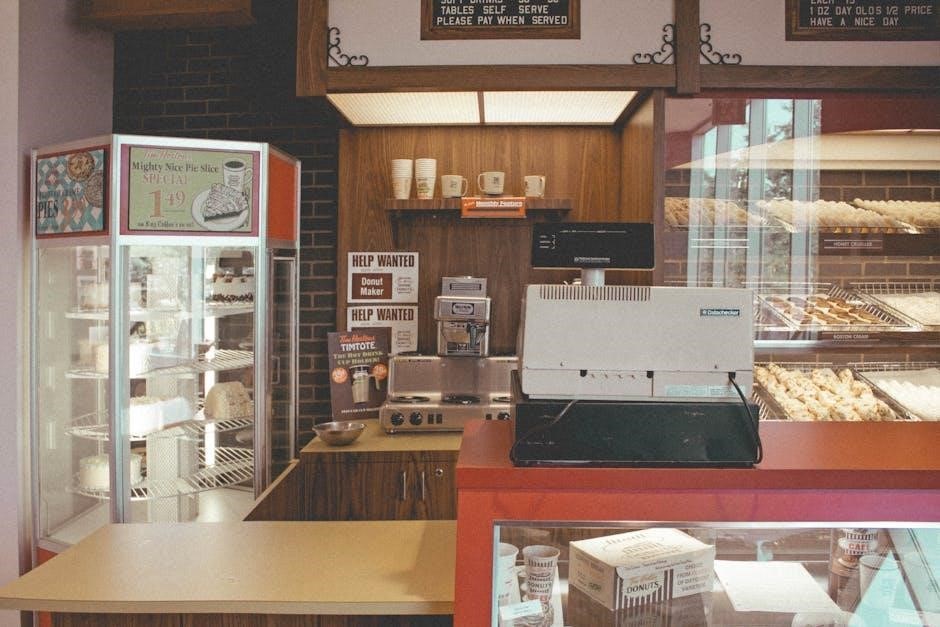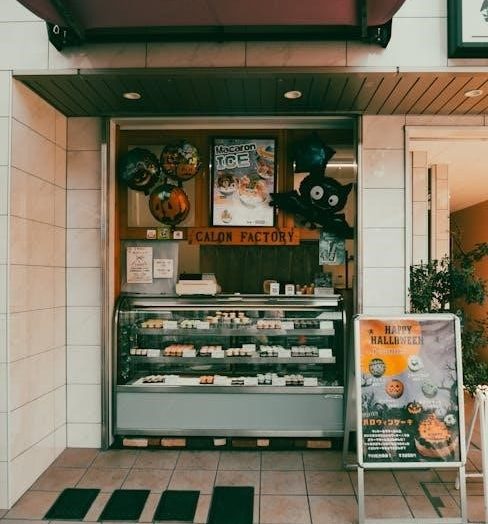Executive Summary
The cake shop business plan outlines a strategic roadmap for launching a successful bakery, emphasizing quality, customer satisfaction, and unique offerings to stand out in the market․
Purpose
The purpose of this cake shop business plan is to outline the goals, objectives, and strategies for establishing a successful bakery․ It aims to provide high-quality, unique, and delicious cakes while creating a welcoming customer experience․ The plan focuses on identifying target markets, competitive advantages, and operational efficiency․ By emphasizing quality ingredients, excellent customer service, and a memorable ambiance, the shop strives to build a loyal customer base and achieve long-term success in the bakery industry․
Business Overview
The cake shop will specialize in offering high-quality, custom-designed cakes, pastries, and specialty baked goods․ Located in a strategic area with high foot traffic, the shop will cater to both walk-in customers and custom orders․ The business will operate as a retail bakery, offering a wide variety of flavors and dietary options to meet diverse customer preferences․ By focusing on quality ingredients and exceptional customer service, the shop aims to establish itself as a trusted and beloved destination for baked goods․
Vision and Mission
Our vision is to become the most beloved cake shop in the community, celebrated for our exquisite designs, exceptional taste, and personalized service․ Our mission is to provide high-quality, custom cakes and baked goods that exceed customer expectations, using premium ingredients and innovative techniques․ We are committed to building long-term relationships with our customers by delivering outstanding value and creating memorable experiences for every occasion․
Market Analysis
The bakery industry is highly competitive, with increasing demand for custom and specialty cakes․ Understanding consumer preferences and trends is crucial for capturing market share effectively․
Industry Overview
The bakery and cake shop industry has experienced steady growth, driven by consumer demand for specialty and custom cakes․ With evolving trends in flavors and designs, the market offers significant opportunities․ Key players focus on quality ingredients and unique offerings to attract customers․ The rise of home bakeries and online ordering further highlights the industry’s adaptability․ Understanding these dynamics is essential for positioning a new cake shop effectively in the competitive landscape․
Target Market
The target market for a cake shop includes individuals celebrating special occasions, such as birthdays and weddings, as well as families and young professionals seeking indulgent treats․ Health-conscious consumers and corporate clients ordering custom cakes for events are also key demographics; The shop will cater to a diverse customer base, emphasizing convenience, quality, and customization to meet varying preferences and dietary needs, ensuring a loyal and broad customer base․
Competitive Analysis
The competitive analysis reveals that the cake shop market is saturated with local bakeries and chain stores offering similar products․ However, opportunities exist to differentiate through unique flavor profiles, superior quality ingredients, and exceptional customer service․ Competitors often lack personalized customization options and fail to leverage social media effectively․ By focusing on niche markets, such as gluten-free or vegan offerings, the shop can carve out a distinct position in the market, attracting health-conscious and specialty cake seekers․

Products and Services
The cake shop offers a variety of delicious treats, including custom cakes, cupcakes, pastries, and specialty desserts․ Services include custom ordering, delivery, and catering for events․
Product Offerings
Our cake shop provides a diverse range of high-quality baked goods, including custom cakes for special occasions, cupcakes, cookies, and pastries․ We also offer gluten-free and vegan options to cater to dietary preferences․ Seasonal specials and limited-edition flavors are introduced regularly to keep the menu fresh and exciting․ Each product is crafted with premium ingredients to ensure exceptional taste and presentation, making us a go-to destination for both everyday treats and celebratory indulgences․ Quality and variety are at the heart of our offerings․
Pricing Strategy
Our cake shop employs a tiered pricing strategy to cater to diverse customer segments․ Standard items like cupcakes and cookies are affordably priced, while custom cakes and specialty pastries are positioned as premium offerings․ We offer discounts for bulk orders and loyalty rewards to encourage repeat business․ Competitive pricing ensures affordability without compromising on quality, leveraging our use of premium ingredients and unique designs to justify higher pricing for bespoke products․
Special Services
Our cake shop offers customized cake designing, catering for events, and gluten-free, vegan, and sugar-free options to meet diverse dietary needs․ We provide complimentary cake tasting sessions for special orders and partner with local businesses for corporate events․ A loyalty program rewards repeat customers, enhancing customer retention and satisfaction․ Seasonal promotions and limited-edition desserts keep our offerings fresh and exciting, attracting both loyal patrons and new clientele․

Marketing and Sales Strategy
We will leverage social media, email marketing, and local partnerships to promote our brand․ Seasonal promotions, in-store experiences, and community events will drive engagement and sales․
Branding and Promotion
Our branding emphasizes high-quality, visually appealing cakes that cater to diverse tastes․ Utilizing vibrant packaging and a strong online presence through social media platforms like Instagram and Facebook, we aim to create a loyal customer base․ Promotional activities include seasonal discounts, influencer partnerships, and community events․ A consistent, memorable logo and tagline will reinforce our brand identity, ensuring recognition and trust in the competitive bakery market․
Sales Channels
To maximize reach, our cake shop will utilize multiple sales channels, including an online platform for orders and deliveries, in-store sales, and partnerships with local cafes and restaurants․ We will also participate in food festivals and local events to showcase our products․ Additionally, social media platforms will be used to promote our offerings and engage with customers, ensuring a seamless and convenient shopping experience for all clients․
Customer Engagement
To foster loyalty, we will implement a loyalty rewards program, offering discounts on repeat purchases․ Social media platforms will be used to engage customers through contests, behind-the-scenes content, and personalized cake designs․ We will also gather customer feedback to continuously improve our offerings․ Additionally, we will host cake-decorating workshops and seasonal promotions to create a sense of community and build long-term relationships with our clients․
Operations Plan
The cake shop will focus on efficient daily operations, ensuring high-quality production and timely delivery․ We will maintain a clean, organized kitchen and adhere to health regulations strictly․
Location and Layout
The cake shop will be strategically located in a central, high-traffic area to maximize visibility and accessibility․ The layout will prioritize functionality, with a welcoming display area showcasing products and an efficient kitchen setup for seamless production․ Ample storage space will be allocated for ingredients and equipment, ensuring smooth operations․ The design will emphasize a clean, inviting atmosphere, adhering to health and safety regulations while enhancing the customer experience․
Equipment and Supplies
The cake shop will require high-quality baking equipment, including industrial mixers, ovens, and refrigerators, to ensure efficient production․ Essential supplies like flour, sugar, and decorating tools will be sourced from reliable vendors․ Packaging materials will be eco-friendly and visually appealing to enhance brand presentation․ Regular maintenance of equipment and timely restocking of supplies will be prioritized to maintain seamless operations and meet customer demand effectively․
Staffing and Training
The cake shop will hire skilled bakers, decorators, and sales staff to ensure high-quality products and excellent customer service․ Comprehensive training programs will be implemented to enhance baking techniques, customer interaction, and safety protocols․ Ongoing professional development will be encouraged to keep staff updated on industry trends․ Clear job roles and responsibilities will be defined to maintain efficiency and teamwork, ensuring a positive work environment that supports business growth and customer satisfaction․
Financial Plan
The financial plan outlines revenue projections, cost estimates, and funding requirements, ensuring the cake shop achieves profitability and sustainability through strategic budgeting and financial management․
Revenue Projections
The cake shop is projected to generate significant revenue through sales of custom cakes, cupcakes, cookies, and other baked goods․ Additional income will come from catering services and subscription boxes․ Revenue is forecasted to grow steadily over the first three years, with an estimated annual increase of 10%․ Detailed financial models outline monthly sales targets, ensuring a strong cash flow to support operations and expansion․ Market analysis and pricing strategies are key to achieving these projections․
Cost Estimates
The initial investment for the cake shop includes equipment, ingredients, and rental costs․ Ongoing expenses such as utilities, staff salaries, and marketing will be budgeted monthly․ Equipment purchases, including mixers and ovens, are estimated at $50,000․ Ingredient costs are projected at $10,000 monthly․ Rental fees for a prime location are $30,000 annually․ Labor costs, including bakery staff and managers, are estimated at $45,000 annually․ Utility expenses are expected to total $15,000 yearly․ These estimates ensure a comprehensive financial plan for sustainable operations․
Funding Requirements
The cake shop requires an initial investment of $200,000 to cover startup costs, including equipment, location setup, and initial inventory․ Funding will be sourced through a combination of personal savings, bank loans, and investor contributions․ A detailed breakdown allocates $100,000 for equipment and renovations, $50,000 for initial inventory and supplies, and $50,000 for marketing and operational reserves․ Repayment plans and investor returns will be outlined in the financial plan, ensuring transparency and accountability for all stakeholders involved in the venture․
Break-Even Analysis
The break-even analysis calculates the point at which the cake shop’s revenues equal its expenses․ Based on projected monthly sales of $30,000 and a contribution margin of 30%, the shop is expected to break even within the first 8 months of operation․ Fixed costs, including rent and equipment, are estimated at $15,000 per month․ This analysis provides a clear financial target, ensuring the business remains sustainable and profitable as it grows and stabilizes in the competitive bakery market․
Profit and Loss Statement
The profit and loss statement outlines the cake shop’s financial performance over a specific period․ It includes revenue from cake sales, custom orders, and other services, minus costs like ingredients, labor, and rent․ Projected annual revenue is $360,000, with a net profit of $72,000 after expenses․ This document highlights profitability trends, helping owners make informed decisions to optimize pricing, reduce waste, and boost margins, ensuring long-term financial sustainability for the business․

Legal Structure and Compliance
Ensuring compliance with local regulations, the cake shop will operate as a registered business, obtaining necessary licenses and permits, and adhering to health and safety standards․
Business Registration
Registering the cake shop involves selecting a legal structure, such as a sole proprietorship, LLC, or partnership․ The business name must be unique and compliant with local regulations․ Obtain necessary licenses and permits, including food service permits and sales tax permits․ Ensure compliance with health and safety regulations․ A business bank account and insurance are also required․ Proper registration ensures legal operation and builds credibility with customers and suppliers, while also facilitating tax compliance and financial management․
Licenses and Permits
To legally operate a cake shop, secure a food service permit from the health department, ensuring compliance with food safety standards․ Obtain a sales tax permit for collecting and remitting taxes on sales․ Check local zoning laws for location approval․ Additional permits may be required for signage, food handling, and fire safety․ These licenses ensure legal compliance, protect public health, and avoid operational disruptions․ Research and obtain all necessary permits before opening to ensure smooth operations and adherence to regulations․
Health and Safety Regulations
Adherence to health and safety regulations is critical for a cake shop․ Implement proper food handling practices, maintain cleanliness, and ensure staff are trained in hygiene protocols․ Regular inspections by local health authorities must be passed to maintain operational compliance․ Proper waste disposal and pest control measures should be in place․ Allergic ingredients must be clearly labeled, and appropriate safety signage should be displayed․ These practices protect both customers and staff, ensuring a safe and healthy environment for food preparation and consumption․

Launch Plan
A strategic launch plan ensures a smooth opening․ Pre-launch includes finalizing the menu, testing operations, and marketing campaigns․ A grand opening event attracts customers and builds brand awareness․
Pre-Launch Preparation
Pre-launch preparation involves finalizing the menu, securing necessary licenses, and setting up the shop․ Marketing campaigns, including social media and local promotions, build anticipation․ Staff training ensures readiness for the grand opening, while suppliers are confirmed for consistent ingredient quality․ Final touches on the shop’s layout and branding are completed to create an inviting atmosphere, ensuring everything is in place for a successful launch․
Grand Opening Strategy
The grand opening will be a high-profile event to attract customers and create buzz․ Promotions, discounts, and free samples will be offered to draw crowds․ A ribbon-cutting ceremony, live music, and kids’ activities will enhance the experience․ Social media campaigns will build excitement, with influencer partnerships to expand reach․ A limited-time “Opening Special” menu will encourage repeat visits․ The goal is to create a memorable first impression, driving long-term customer loyalty and establishing the shop as a go-to destination for cake lovers․
Risk Management
Identify potential risks like market competition and supply chain disruptions․ Implement strategies such as diversifying product offerings and securing reliable suppliers to mitigate these challenges effectively․
Potential Risks
Starting a cake shop involves risks such as market competition, supply chain disruptions, and health regulation compliance․ Economic downturns may reduce consumer spending on luxury items like cakes․ Additionally, ingredient shortages or price fluctuations could impact profitability․ Equipment failures or staffing issues might disrupt operations․ Non-compliance with health and safety regulations could lead to legal penalties or reputational damage․ These risks require proactive planning and mitigation strategies to ensure business stability and growth․
Mitigation Strategies
To address potential risks, implement diversification of suppliers to avoid shortages and negotiate long-term contracts for stable pricing․ Invest in robust quality control measures and regular staff training to maintain high standards․ Develop a financial cushion to handle unexpected expenses and explore alternative revenue streams, such as online sales or custom orders․ Regularly review and update compliance with health regulations and maintain adequate insurance coverage․ Engage in market research to stay ahead of competitors and adapt to changing consumer preferences proactively․
Monitoring and Evaluation
Regularly track key performance indicators, such as sales growth, customer satisfaction, and profit margins, to ensure alignment with business goals and make timely adjustments as needed․
Performance Metrics
Key metrics include sales growth, profit margins, customer satisfaction scores, and foot traffic․ Track daily, weekly, and monthly sales to measure financial performance․ Monitor customer feedback through surveys and reviews to assess service quality․ Analyze social media engagement to gauge brand awareness․ Measure order fulfillment times and product availability to evaluate operational efficiency․ Regularly review inventory turnover and waste reduction efforts to ensure cost-effectiveness․ These metrics provide insights into business health and guide strategic adjustments to achieve long-term success․
Review and Adjustment
Regularly review business performance to identify strengths, weaknesses, and areas for improvement․ Analyze financial reports, customer feedback, and operational efficiency to assess progress toward goals․ Adjust strategies based on market trends, customer preferences, and competitive dynamics․ Flexibility in adapting plans ensures long-term sustainability․ Schedule quarterly reviews to evaluate milestones and make data-driven decisions․ Continuous improvement fosters resilience and growth, ensuring the business remains aligned with its vision and mission in a dynamic market environment․
The cake shop business plan provides a comprehensive framework for establishing and growing a successful bakery․ By focusing on quality, customer satisfaction, and strategic marketing, the business aims to create a loyal customer base․ Financial projections and operational strategies ensure sustainability․ Continuous improvement and adaptability will drive long-term success․ This plan serves as a roadmap to achieve the vision of becoming a beloved destination for cake enthusiasts, offering unique and delicious treats that exceed expectations․
Additional Resources
Explore our templates, samples, and guides for crafting a robust cake shop business plan․ Visit our website for detailed resources, including marketing and financial planning tools․
Templates and Samples
Access our premium cake shop business plan templates and samples to streamline your planning process․ These professionally designed templates are available in A4 and US letter sizes, offering a comprehensive structure for outlining your business objectives, financial projections, and operational strategies․ Whether you’re a startup or an established bakery, these resources provide a customizable framework to ensure your plan is detailed and organized․ Download instantly and easily edit to suit your specific needs, saving time and effort in creating a robust business plan․
Further Reading
Explore additional resources to deepen your understanding of the cake shop business․ Discover industry trends, marketing strategies, and operational insights through books like “The Ultimate Guide to Launching a Successful Cake Shop or Bakery Business” and online courses on bakery management․ Additionally, review articles on health and safety regulations, financial planning, and customer engagement to ensure a well-rounded approach to your business plan․ Utilize checklists and guides to stay organized and informed throughout your entrepreneurial journey․
